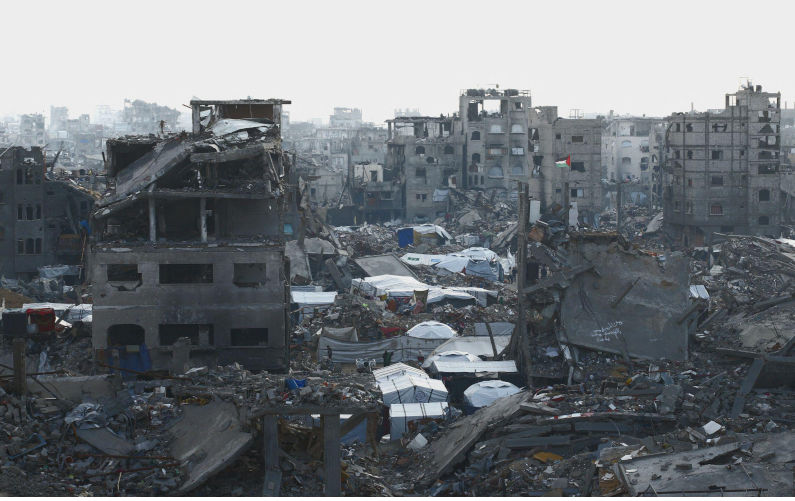Gaza conditions 'worse than hell on Earth': Red Cross chief
June 8, 2025
“We cannot continue to watch what is happening,” said Mirjana Spoljaric. “It’s surpassing any acceptable legal, moral, and humane standard.”
The president of one of the world’s top humanitarian groups said in an interview on Wednesday (4 June) that nearly 20 months after Israel began its relentless assault on Gaza, the international community is watching “a type of warfare… that deprives civilians of their dignity entirely”.
Jeremy Bowen, international editor for BBC News, asked International Committee of the Red Cross president Mirjana Spoljaric about comments she made last month when she visited Gaza, several weeks into Israel’s total blockade on humanitarian aid, and declared that the enclave had been transformed into “hell on Earth”.
“Has anything changed?” asked Bowen.
“It has become worse,” replied Spoljaric. “Humanity is failing in Gaza… We cannot continue to watch what is happening. It’s surpassing any acceptable legal, moral, and humane standard.”
Spoljaric’s latest remarks came a week after the US- and Israel-backed Gaza Humanitarian Foundation began its aid operations, with proponents claiming the private company, staffed by US security contractors, would save the lives of Gaza residents who have faced increasing starvation and malnutrition since the current blockade began in March – while ensuring Hamas did not steal or divert the aid. The United Nations has said there is no evidence Hamas has systematically diverted relief from civilians.
Fears about the GHF’s plan — expressed by aid organisations, the UN, and the former executive director who resigned the day before operations began — have been proven correct since the group opened its distribution sites in southern Gaza last week. At least 27 Palestinians were killed on Tuesday (3 June) at one of the aid sites when the Israel Defence Forces opened fire — yet another incident of the IDF killing of people trying to obtain aid.
The ICRC said its field hospital in Rafah received “a mass casualty influx of 184 patients” early on Tuesday morning.
“This includes 19 cases who were declared dead upon arrival and eight more who died due to their wounds shortly after,” said the group. “The majority of cases suffered gunshot wounds. Again, all responsive patients said they were trying to reach an assistance distribution site.”
Mohamed Zidan, the husband of a woman named Reem Al Akhras who was killed in Tuesday’s mass shooting, said the GHF operation was “not humanitarian aid – it’s a trap”.
“She went to bring us some food, and this is what happened to her,” her son Zain Zidan told Al Jazeera.
Journalist Rania Khalek condemned corporate news outlets for their reports of “conflicting accounts” as Israel said the IDF fired only at “several suspects moving toward them”.
“Outrageous,” said Khalek. “The Israelis are proven liars, their narrative should not be given any legitimacy. CNN continues to cover for genocide, shameful.”
Israeli forces also opened fire at one of the sites on Sunday (1 June), killing 20 people and wounding hundreds who had walked an average of 9.3 miles to the distribution hub, hoping to carry home food boxes weighing about 44 pounds, with enough food to last about three days before they would need to make the trek — and avoid IDF soldiers stationed at the sites — again.
On Wednesday, the GHF said its four distribution sites would be closed for the day to improve “organisation and efficiency”, while the IDF warned Palestinians to stay away from the sites and the roads leading to them, saying they had been designated “combat zones”.
UN Secretary-General António Guterres demanded an independent inquiry into the killing of Palestinians at food distribution sites.
“It is unacceptable that Palestinians are risking their lives for food,” he said.
Gaza’s Health Ministry reported on Wednesday that at least 94 Palestinians had been killed and 440 had been wounded in Israel’s attacks across the enclave in the previous 24 hours.
In her interview with the BBC, Spoljaric said that the destruction of more than 90% of Gaza’s housing units, the risk of famine for the entire population and the forced displacement of 90% of Palestinians in the enclave represent “a people being entirely stripped of its human dignity”.
“There is no excuse for depriving children of their access to food, health, and security,” said Spoljaric. “There are rules in the conduct of hostilities that every party to every conflict has to respect.”
She called on international leaders to take all available actions to stop “a type of warfare that shows utmost disrespect for civilians”.
“Today we are in it,” Spoljaric said. “Today we can reverse it. We can save lives today.”
Few US officials have called for an end to the government’s support for the IDF, and the US continues to repeat Israel’s claim that it is acting in self-defence and targeting Hamas rather than civilians.
Several European leaders in recent weeks have harshly criticised Israel’s intensified military campaign in Gaza and its humanitarian aid blockade, with German Foreign Minister Johann Wadephul suggesting the country could soon impose arms export sanctions.
“It’s important to act now,” said Spoljaric. “State leaders are under an obligation to act.”
Republished from Common Dreams, 4 June 2025
The views expressed in this article may or may not reflect those of Pearls and Irritations.

